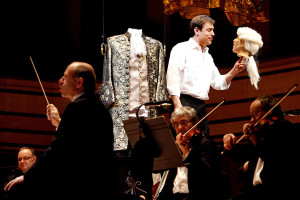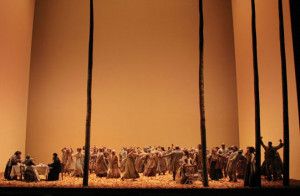VIEWPOINTS: When Performing Opera, Is Less More?
- By drediman
- March 3, 2014
- No Comments
After attending Saturday night’s exhilarating account of Richard Strauss’s voluptuous “Salome” by the Vienna Philharmonic and Vienna State Opera (led powerfully by young Latvian conductor Andris Nelsons) at Carnegie Hall, I was reminded by how much I enjoy opera in concert format or in minimalist productions.
 Over the years, I’ve sat through some thrilling operas performed in concert versions. Although the performance of music from operas is not uncommon practice in concert halls, typically only famous, bite-sized segments of operas are played. Orchestras usually stick to well-known overtures and musical interludes (Rossini’s “William Tell” overture, anyone?) or even famous acts from operas (Act II of Wagner’s “Die Walkure”). Because really, the thought is, who wants to sit through four hours of Verdi or Wagner in concert without the fancy sets and costumes afforded by the world’s premier opera houses? I beg to differ. Some of the most fulfilling opera experiences I’ve had have been in concert halls with little to no sets, costumes, and theatrical lighting to speak of. Certainly, last weekend’s “Salome” comes to mind, but also the Chicago Symphony Orchestra’s complete renditions of Verdi’s “Otello” in 2011 (conducted by current CSO music director Riccardo Muti) and Wagner’s “Tristan und Isolde” back in 2001 (led by former maestro Daniel Barenboim). The Budapest Festival Orchestra’s incandescent semi-staged concert of Mozart’s “Le nozze di Figaro” (effervescently conducted by Ivan Fischer) last year also makes the grade. Unlike plays, many of which rely on naturalism to engage an audience in their dramatic proceedings, much of the drama in opera lies within the orchestral and vocal writing. Therefore, I believe that by allowing the musical performance of opera to come to the forefront acoustically, as it inevitably does in concert performances, so does the drama, making for a more vivid and impactful experience. This is opposed to performances in the opera house, where the power of the orchestra is somewhat muted by performing in a pit. Also, opera singers tend to give more truthful performances when they do not have to contend with overpowering costumes and directorial points of views. Ironically, sets and costumes may act against immersing audiences since they allow audiences to be conscious of the fact that they are watching a performance. Sometimes in opera, all one needs to suspend disbelief is simply for the music to be performed well. However, this is true only if the musical performance ascends the heights of greatness, as the tremendous aforementioned concert performances led by maestros Nelsons, Muti, and Barenboim have. Indeed, in the opera house, without excellence from the orchestra and singers, having the physical production to fall back on can be a saving grace. But given my positive experience with concert versions of operas in total, I hope that orchestras and opera companies will start giving more credit to the effectiveness of the “opera in concert” experience and produce them more frequently as a regular part of their seasons.
Over the years, I’ve sat through some thrilling operas performed in concert versions. Although the performance of music from operas is not uncommon practice in concert halls, typically only famous, bite-sized segments of operas are played. Orchestras usually stick to well-known overtures and musical interludes (Rossini’s “William Tell” overture, anyone?) or even famous acts from operas (Act II of Wagner’s “Die Walkure”). Because really, the thought is, who wants to sit through four hours of Verdi or Wagner in concert without the fancy sets and costumes afforded by the world’s premier opera houses? I beg to differ. Some of the most fulfilling opera experiences I’ve had have been in concert halls with little to no sets, costumes, and theatrical lighting to speak of. Certainly, last weekend’s “Salome” comes to mind, but also the Chicago Symphony Orchestra’s complete renditions of Verdi’s “Otello” in 2011 (conducted by current CSO music director Riccardo Muti) and Wagner’s “Tristan und Isolde” back in 2001 (led by former maestro Daniel Barenboim). The Budapest Festival Orchestra’s incandescent semi-staged concert of Mozart’s “Le nozze di Figaro” (effervescently conducted by Ivan Fischer) last year also makes the grade. Unlike plays, many of which rely on naturalism to engage an audience in their dramatic proceedings, much of the drama in opera lies within the orchestral and vocal writing. Therefore, I believe that by allowing the musical performance of opera to come to the forefront acoustically, as it inevitably does in concert performances, so does the drama, making for a more vivid and impactful experience. This is opposed to performances in the opera house, where the power of the orchestra is somewhat muted by performing in a pit. Also, opera singers tend to give more truthful performances when they do not have to contend with overpowering costumes and directorial points of views. Ironically, sets and costumes may act against immersing audiences since they allow audiences to be conscious of the fact that they are watching a performance. Sometimes in opera, all one needs to suspend disbelief is simply for the music to be performed well. However, this is true only if the musical performance ascends the heights of greatness, as the tremendous aforementioned concert performances led by maestros Nelsons, Muti, and Barenboim have. Indeed, in the opera house, without excellence from the orchestra and singers, having the physical production to fall back on can be a saving grace. But given my positive experience with concert versions of operas in total, I hope that orchestras and opera companies will start giving more credit to the effectiveness of the “opera in concert” experience and produce them more frequently as a regular part of their seasons.
 For the much of the same reasons, operas in minimalist productions have also captured my attention, particularly those directed by Canadian opera director Robert Carsen. His stagings engage the music and avoid unnecessary onstage clutter. The directorial choices he makes seem to be sensitive reactions to what’s happening in the score, making his productions deeply moving experiences for me. His productions controversially strip the scenic elements to their bare minimum and instead focus on dramatic lighting and ritualistic blocking for the chorus. As a result, Carsen’s productions are a perfect communion between music and stagecraft and the effect has been mesmerizing time and time again. I’ve had the great opportunity to experience a number of Carsen’s productions over the years, including Poulenc’s “Dialogues of the Carmelites” for the Royal Opera, Tchaikovsky’s “Eugene Onegin” and Verdi’s “Falstaff” for the Metropolitan Opera, Gluck’s “Iphegenie en Tauride” and “Orfeo ed Euridice” for the Chicago Lyric Opera, and Dvorak’s “Rusalka” for the Paris Opera. I hope to experience many more Carsen or Carsen-like productions in the years to come.
For the much of the same reasons, operas in minimalist productions have also captured my attention, particularly those directed by Canadian opera director Robert Carsen. His stagings engage the music and avoid unnecessary onstage clutter. The directorial choices he makes seem to be sensitive reactions to what’s happening in the score, making his productions deeply moving experiences for me. His productions controversially strip the scenic elements to their bare minimum and instead focus on dramatic lighting and ritualistic blocking for the chorus. As a result, Carsen’s productions are a perfect communion between music and stagecraft and the effect has been mesmerizing time and time again. I’ve had the great opportunity to experience a number of Carsen’s productions over the years, including Poulenc’s “Dialogues of the Carmelites” for the Royal Opera, Tchaikovsky’s “Eugene Onegin” and Verdi’s “Falstaff” for the Metropolitan Opera, Gluck’s “Iphegenie en Tauride” and “Orfeo ed Euridice” for the Chicago Lyric Opera, and Dvorak’s “Rusalka” for the Paris Opera. I hope to experience many more Carsen or Carsen-like productions in the years to come.

 Copyright © 2025
Copyright © 2025
Leave a Reply